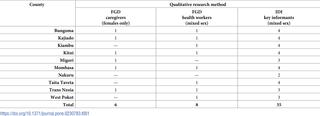Our official English website, www.x-mol.net, welcomes your
feedback! (Note: you will need to create a separate account there.)
Qualitative insights into reasons for missed opportunities for vaccination in Kenyan health facilities.
PLOS ONE ( IF 2.9 ) Pub Date : 2020-03-30 , DOI: 10.1371/journal.pone.0230783 Anyie J Li 1, 2 , Collins Tabu 3 , Stephanie Shendale 4 , Peter O Okoth 5 , Kibet Sergon 6 , Ephantus Maree 3 , Isaac K Mugoya 7 , Zorodzai Machekanyanga 8 , Iheoma U Onuekwusi 6 , Ikechukwu Udo Ogbuanu 2, 4
PLOS ONE ( IF 2.9 ) Pub Date : 2020-03-30 , DOI: 10.1371/journal.pone.0230783 Anyie J Li 1, 2 , Collins Tabu 3 , Stephanie Shendale 4 , Peter O Okoth 5 , Kibet Sergon 6 , Ephantus Maree 3 , Isaac K Mugoya 7 , Zorodzai Machekanyanga 8 , Iheoma U Onuekwusi 6 , Ikechukwu Udo Ogbuanu 2, 4
Affiliation

|
BACKGROUND
In 2016, Kenya conducted a study of missed opportunities for vaccination (MOV)-when eligible children have contact with the health system but are not fully vaccinated-to explore some of the reasons for persistent low vaccination coverage. This paper details the qualitative findings from that assessment.
METHODS
Using the World Health Organization MOV methodology, teams conducted focus group discussions among caregivers and health workers and in-depth interviews of key informants in 10 counties in Kenya. Caregivers of children <24 months of age visiting the selected health facilities on the day of the assessment were requested to participate in focus group discussions. Health workers were purposively sampled to capture a broad range of perspectives. Key informants were selected based on their perceived insight on immunization services at the county, sub-county, or health facility level.
RESULTS
Six focus group discussions with caregivers, eight focus group discussions with health workers, and 35 in-depth interviews with key informants were completed. In general, caregivers had positive attitudes toward healthcare and vaccination services, but expressed a desire for increased education surrounding vaccination. In order to standardize vaccination checks at all health facility visits, health workers and key informants emphasized the need for additional trainings for all staff members on immunization. Health workers and key informants also highlighted the negative impact of significant understaffing in health facilities, and the persistent challenge of stock-outs of vaccines and vaccination-related supplies.
CONCLUSIONS
Identified factors that could contribute to MOV include a lack of knowledge surrounding vaccination among caregivers and health workers, inadequate number of health workers, and stock-outs of vaccines or vaccination-related materials. In addition, vaccination checks outside of vaccination visits lacked consistency, leading to MOV in non-vaccinating departments. Qualitative assessments could provide a starting point for understanding and developing interventions to address MOV in other countries.
中文翻译:

对肯尼亚卫生机构错过疫苗接种机会的原因的定性见解。
背景技术2016年,肯尼亚进行了一项针对错过的疫苗接种机会(MOV)的研究-当合格的儿童与卫生系统接触但尚未完全接种疫苗时-探究接种疫苗覆盖率持续偏低的一些原因。本文详细介绍了该评估的定性结果。方法采用世界卫生组织的MOV方法,团队在护理人员和卫生工作者之间进行了焦点小组讨论,并对肯尼亚10个县的主要信息提供者进行了深入访谈。在评估之日,要求年龄小于24个月的儿童的看护者访问选定的医疗机构,参加焦点小组讨论。目的是对卫生工作者进行抽样,以获取广泛的观点。根据关键知情者在县,县(县)或卫生机构一级对免疫服务的感知见解,选出了他们。结果与护理人员进行了六次焦点小组讨论,与卫生工作者进行了八次焦点小组讨论,并与关键信息提供者进行了35次深入访谈。总体而言,看护者对医疗保健和疫苗接种服务持积极态度,但表示希望加强有关疫苗接种的教育。为了使所有医疗机构访问时的疫苗检查标准化,卫生工作者和主要信息提供者强调需要对所有工作人员进行额外的免疫培训。卫生工作者和关键信息提供者还强调了卫生机构人员严重不足的负面影响,以及疫苗和与疫苗相关的用品缺货的持续挑战。结论可能导致MOV的因素包括对护理人员和医护人员的疫苗知识缺乏,医护人员人数不足以及疫苗或疫苗相关材料的缺货。另外,在疫苗访视之外的疫苗检查缺乏一致性,导致非疫苗部门的MOV。定性评估可以为了解和制定应对其他国家MOV的干预措施提供一个起点。以及疫苗或疫苗相关材料的缺货。另外,在疫苗访视之外的疫苗检查缺乏一致性,导致非疫苗部门的MOV。定性评估可以为了解和制定应对其他国家MOV的干预措施提供一个起点。以及疫苗或疫苗相关材料的缺货。另外,在疫苗访视之外的疫苗检查缺乏一致性,导致非疫苗部门的MOV。定性评估可以为了解和制定应对其他国家MOV的干预措施提供一个起点。
更新日期:2020-03-30
中文翻译:

对肯尼亚卫生机构错过疫苗接种机会的原因的定性见解。
背景技术2016年,肯尼亚进行了一项针对错过的疫苗接种机会(MOV)的研究-当合格的儿童与卫生系统接触但尚未完全接种疫苗时-探究接种疫苗覆盖率持续偏低的一些原因。本文详细介绍了该评估的定性结果。方法采用世界卫生组织的MOV方法,团队在护理人员和卫生工作者之间进行了焦点小组讨论,并对肯尼亚10个县的主要信息提供者进行了深入访谈。在评估之日,要求年龄小于24个月的儿童的看护者访问选定的医疗机构,参加焦点小组讨论。目的是对卫生工作者进行抽样,以获取广泛的观点。根据关键知情者在县,县(县)或卫生机构一级对免疫服务的感知见解,选出了他们。结果与护理人员进行了六次焦点小组讨论,与卫生工作者进行了八次焦点小组讨论,并与关键信息提供者进行了35次深入访谈。总体而言,看护者对医疗保健和疫苗接种服务持积极态度,但表示希望加强有关疫苗接种的教育。为了使所有医疗机构访问时的疫苗检查标准化,卫生工作者和主要信息提供者强调需要对所有工作人员进行额外的免疫培训。卫生工作者和关键信息提供者还强调了卫生机构人员严重不足的负面影响,以及疫苗和与疫苗相关的用品缺货的持续挑战。结论可能导致MOV的因素包括对护理人员和医护人员的疫苗知识缺乏,医护人员人数不足以及疫苗或疫苗相关材料的缺货。另外,在疫苗访视之外的疫苗检查缺乏一致性,导致非疫苗部门的MOV。定性评估可以为了解和制定应对其他国家MOV的干预措施提供一个起点。以及疫苗或疫苗相关材料的缺货。另外,在疫苗访视之外的疫苗检查缺乏一致性,导致非疫苗部门的MOV。定性评估可以为了解和制定应对其他国家MOV的干预措施提供一个起点。以及疫苗或疫苗相关材料的缺货。另外,在疫苗访视之外的疫苗检查缺乏一致性,导致非疫苗部门的MOV。定性评估可以为了解和制定应对其他国家MOV的干预措施提供一个起点。











































 京公网安备 11010802027423号
京公网安备 11010802027423号